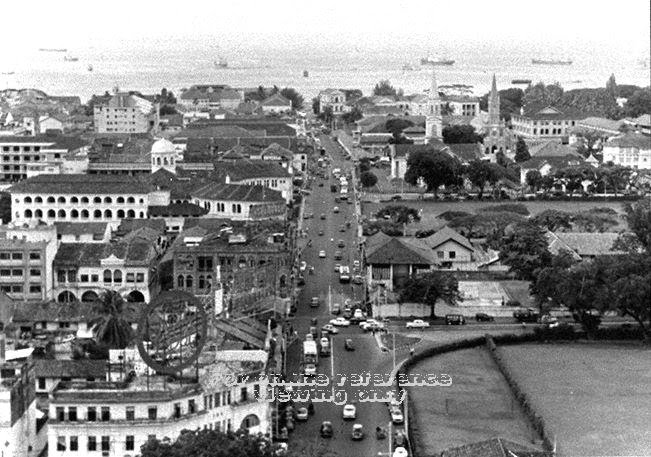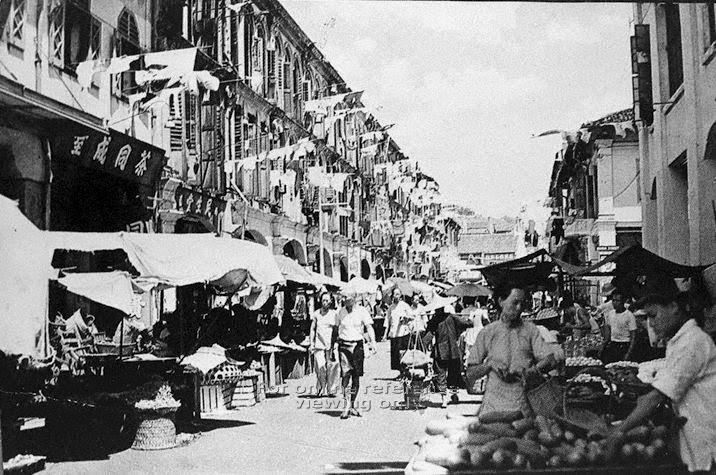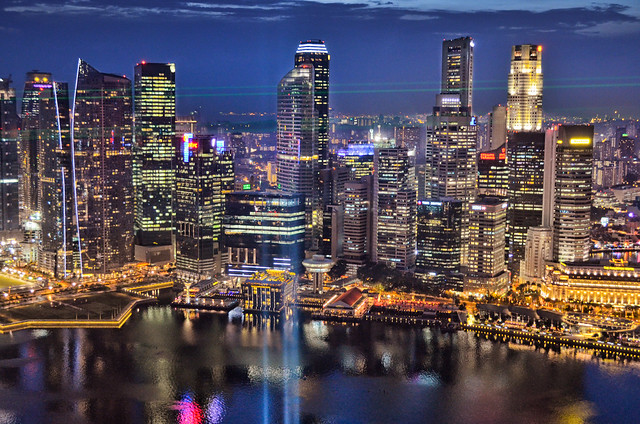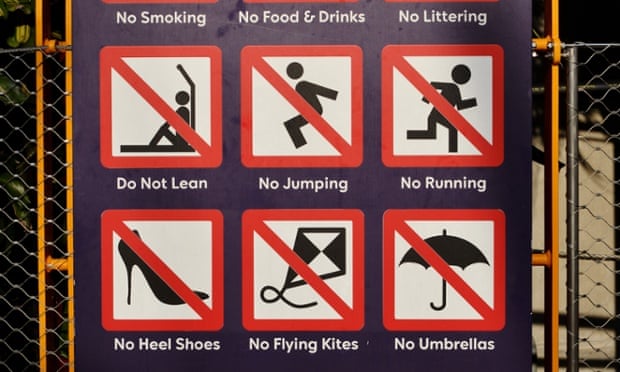
1923-2015.
He's up there with Deng Xiaoping, Margaret Thatcher, Lech Walesa and the other greats of the last century.
All hail Lee Kuan Yew!
Moderator: Community Team















Lee was also widely praised by other world leaders. Henry Kissinger once said that Lee was "One of the asymmetries of history". Richard Nixon remarked that if Lee lived in another time and place, he would have attained the world stature of a Churchill, a Disraeli, or a Gladstone. Bill Clinton and George H.W. Bush called Lee a "remarkable leader and statesman" and "one of the brightest and most effective world leaders that I have ever known" respectively during the launch of his book, "Hard Truths to Keep Singapore Going". Former British Prime Minister Margaret Thatcher praised “his way of penetrating the fog of propaganda and expressing with unique clarity the issues of our time and the way to tackle them." Her successor, Tony Blair, said of Lee: he is "the smartest leader I ever met."






















Do you want to come here and insult other people's race and religion? Maybe these are fundamental freedoms in your country, but in ours, because we have experienced deadly racial riots at the birth of our country, these are a no-no. But then again, why would you want to purposely offend others anyway?
Or maybe you want to tell lies about our public figures, accuse them of corruption when you have no evidence to back them up, or accuse them of stealing, cheating, or all manner of untruths? If so, then be prepared to be sued for libel. Even if Western societies think that you can say these things about your political figures, we don't and we are better for it.
And those political opponents of Mr Lee who have been bankrupted, allegedly because they were such formidable foes? No such thing. Mr JB Jeyeratnam and Mr Chee Soon Juan may be the martyrs much adored by the Western press, but have you heard of Mr Chiam See Tong, the longest-serving opposition Member of Parliament who won five consecutive elections against Mr Lee's People's Action Party? Or Mr Low Thia Kiang, who not only won five consecutive general elections, but in the last one in 2011, also led a team that unseated the incumbent Minister for Foreign Affairs and our first-ever female Cabinet minister?
Both these opposition MPs have never been sued, much less bankrupted. In fact, Mr Chiam won several libel lawsuits against Mr Lee's ministers. You would never have heard of them, or have chosen not to, because it doesn't fit the Western narrative that legitimate opposition was stifled by Mr Lee through lawsuits. It doesn't suit your narrative of trade-offs. The fact is that every single opposition politician successfully sued for libel engaged in the type of politics that we do not want, the kind founded on vicious lies being told in the name of political campaigning.
What about detention without trial? Again and again ad nauseam, the Western press has used the example of Operation Cold Store to bolster its narrative of Mr Lee as an autocrat, where 111 left-wing politicians were arrested on suspicion of being communist in 1964.
But what about Operation Demetrius, where in 1971, 342 persons suspected of being involved with the IRA were detained without trial by the British Army? Or closer to the present where thousands have been interred without trial by the United States in Guantanamo Bay on suspicion of being terrorists? Firstly, detention without trial is not something used only by the Singapore Government, but countries need to make their own judgment about applying such laws when they feel their security is threatened and the normal judicial process is inadequate; in the 60s and 70s, communists inciting armed revolution were Singapore's greatest threat.
Whether those people were indeed communists will be a question no doubt debated endlessly by historians, in the same way as whether the 342 in Northern Ireland were indeed IRA members, or the thousands in Guantanamo Bay were indeed terrorists.
So where is the trade-off? How are we unfree?
I tell you what freedom is.
Freedom is being able to walk on the streets unmolested in the wee hours in the morning, to be able to leave one's door open and not fear that one would be burgled. Freedom is the woman who can ride buses and trains alone; freedom is not having to avoid certain subway stations after night falls. Freedom is knowing our children can go to school without fear of drugs, or being mowed down by some insane person with a gun. Freedom is knowing that we are not bound by our class, our race, our religion, and we can excel for the individuals that we are - the freedom to accomplish. Freedom is living in one of the least corrupt societies in the world, knowing that our ability to get things done is not going to be limited by our ability to pay someone. Freedom is fresh air and clean streets, because nothing is more inimical to our liberty of movement than being trapped at home because of suffocating smog.
These are the freedoms that Singaporeans have, freedoms that were built on the vision and hard work of Mr Lee, our first Prime Minister. And we have all of these, these liberties, while also being one of the richest countries in the world.











































Jake van der Kamp wrote:De mortuis nil nisi bonum, they say, and I largely agree. Say nothing but good about the dead.
But there has to be a limit to it or history would be nothing but a collection of rosy obituaries. Decency says one should wait until after the funeral and then a more objective retrospective is entirely seemly.
I have in mind the scene at the Pearly Gates as Lee Kuan Yew arrives. St Peter enters a check mark into his book, turns to him and says, "Block H, room 4523D. Pick up your keys from the porter."
"Wait a moment," says Mr Lee. "Don't I deserve a few words of praise for all that I have done for Singapore?"
"You do indeed," says St Peter. "But on earth you were already given every word of it. Next."
On a cruise through the Indonesian spice islands last week I chanced across a copy of Singapore's English language newspaper, The Straits Times. It opened to about 20 pages of fulsome tribute to Mr Lee with the little wider news squeezed in at the back.
He himself set the tone for this with his 1998 two volume auto-hagiography - The Singapore Story and From Third World to First - and he had a name for telling foreign politicians how to run their affairs while deeming it improper interference in Singapore's when the shoe was on the other foot.
The story has it that he once tried telling Deng Xiaoping how to run China and was told, "Thank you, Mr Lee, and when I become mayor of Shanghai I shall ask you for your advice." If the story is apocryphal it nonetheless rings true.
But let us give him his due. He claimed credit for Singapore's rise as a wealthy, racially harmonious, meritocratic state and fairly so. This is modern Singapore and he played the key role in it. And now let us pull a leaf or two from these laurels.
Singapore, like Hong Kong, prospers as a parasite economy feeding off its larger neighbours by providing them services, sometimes a little dubious, that they cannot or will not provide for themselves.
Mix in the commercial aptitude characteristic of all expatriate populations, Chinese in this case, add the second half of the 20th century's conditions of global prosperity, technology transfers and foreign investment and Mr Lee had a lot of help. The success was, in fact, attributable to all Singaporeans. No man is an island.
Similarly, Singapore's racial harmony is indeed a great virtue but, having been forced into independence when its overwhelmingly Chinese character was seen as a threat to a Malayan union, Singapore has since never really come under critical racial strain. Mr Lee, however, also made much of thrift, hard work and family loyalty, among other traits, as being Asian values.
Am I therefore to believe that my own grandmothers in the Netherlands, whom I remember for all these values, possessed them by a non-European stroke of luck or that there is no respect for them in America?
The notion that they are specifically Asian is racist. These are human virtues.
As to Singapore's meritocratic nature, yes, in the matter of promotions within the civil service and ruling party undoubtedly so, but in commerce it is not quite such a collection of the best. A big difference from Hong Kong, for instance, is Singapore's heavy reliance on continuous infusions of foreign investment.
The bureaucrats' own investment record is generally poor. And whoever it was who called the English a nation of shopkeepers had certainly never visited Singapore.
I think our own Martin Lee Chu-ming made a worthwhile point in his summation of Mr Lee's record.
Here was a man whose tight control of the people he governed suggests that he did not really trust them. They may yet pay a price for this now that he has entirely left them to rely on their own devices.
Mr Lee was a man of great energy, initiative and determination at a time when Singapore needed just these strengths in a leader. But he arguably kept his fingers stuck in the pie too long. He might have served his people better with an earlier and fuller retirement of the Lee family from Singapore politics.
Minxin Pei wrote:The death of Lee Kuan Yew, Singapore's founding father, offers an occasion to reflect on his legacy - and, perhaps more importantly, on whether that legacy has been correctly understood.
During his 31 years as prime minister, Lee crafted a unique system of government, intricately balancing authoritarianism with democracy and state capitalism with the free market. Known as "the Singapore model", Lee's brand of governance is often mischaracterised as a one-party dictatorship superimposed on a free-market economy. His success in transforming Singapore into a prosperous city state is frequently invoked by authoritarian rulers as justification for their tight control of society - and nowhere more so than in China.
Indeed, President Xi Jinping is pursuing a transformative agenda heavily influenced by the Singapore model - a relentless war on corruption, a broad crackdown on dissent and pro-market economic reforms. The Chinese Communist Party sees in Singapore a vision of its future: the perpetuation of its monopoly on political power in a prosperous capitalist society.
But the Singapore model, as China's rulers understand it, never existed. To emulate Lee's model of government - rather than its cartoon caricature - would require allowing a far more democratic system than the Communist Party would ever tolerate.
The true secret of Lee's political genius was not his skilful use of repressive practices, such as launching lawsuits against the media or his political opponents; such tactics are unremarkable in semi-authoritarian regimes. What Lee did that was truly revolutionary was to use democratic institutions and the rule of law to curb the predatory appetite of his country's ruling elite.
Unlike China, Singapore allows opposition parties to contest in competitive and free (though not necessarily fair) elections. In the last parliamentary election in 2011, six opposition parties won a total of 40 per cent of the vote. Should the People's Action Party (PAP), the party Lee founded, lose its legitimacy due to poor governance, Singapore's voters could throw it out of office.
By holding regular competitive elections, Lee effectively established a mechanism of political self-enforcement and accountability - he gave Singaporean voters the power to decide whether the PAP should stay in power. This enforcement mechanism has maintained discipline within Singapore's ruling elite and makes its promises credible.
Regrettably, most of the rest of the world has never given Lee proper credit for crafting a hybrid system of authoritarianism and democracy that vastly improved the well-being of his country's citizens, without subjecting them to the brutality and oppression to which many of its neighbours have resorted.
China would be wise to embrace this model, by introducing a considerable degree of democracy and strengthening adherence to the rule of law. This would mean, at a minimum, legalising organised political opposition, introducing competitive elections, and creating an independent judiciary. Its citizens would benefit immensely.
Emulating Lee would allow China to achieve immense progress and become a more humane and open society with a brighter future. Sadly, there is almost no chance of this happening. When China's leaders cite the Singapore model, what they have in mind is limited to the perpetuation of their power. They want the benefits of political dominance, without the checks imposed by a competitive institutional context.
Lee may have been sceptical about the benefits of democracy, but he understood its usefulness. By contrast, China's leaders view democracy as an existential ideological threat that must be neutralised at any cost.
Unfortunately, Lee is no longer with us. But it would behoove the Communist Party - if for no other reason than simple respect for one of Asia's great statesmen - to stop appropriating the Singapore brand in the service of a completely different agenda.



























Return to Practical Explanation about Next Life,
Users browsing this forum: bigtoughralf, kennyp72